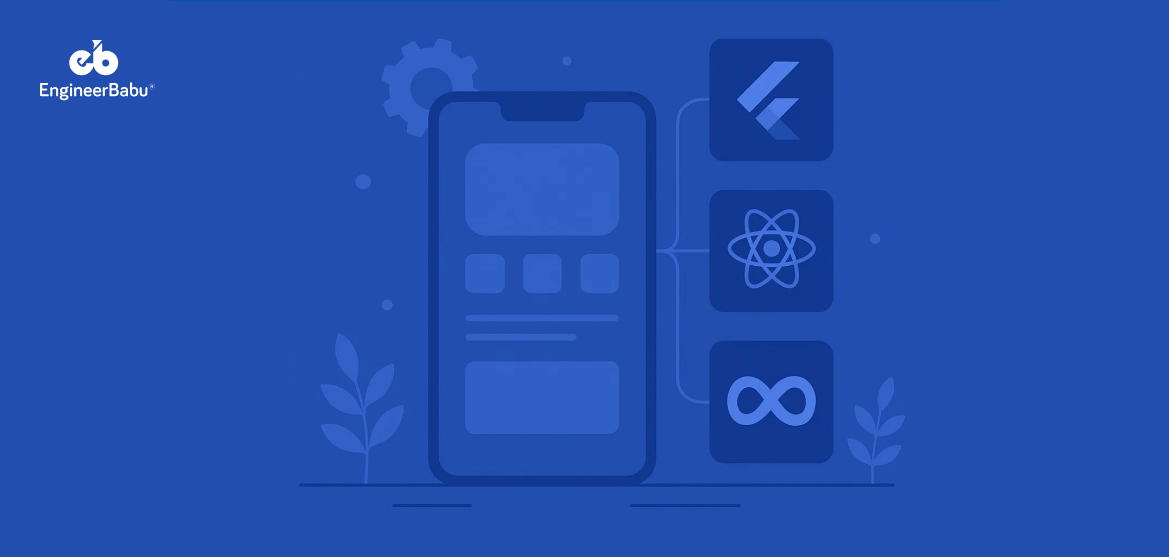Building an app that runs smoothly across multiple platforms is no longer a nice-to-have, it’s a competitive necessity. In 2025, over 70% of mobile apps are developed using cross-platform frameworks. Businesses are realising that maintaining separate codebases for iOS, Android, and web is inefficient, costly, and slows down time-to-market.
Whether you’re a startup aiming to launch quickly or an enterprise looking to unify your digital ecosystem, choosing the right framework is one of the most critical decisions you’ll make.
Therefore, in this comprehensive guide, we’ll explore the best cross-platform app frameworks in 2025, what makes each unique, and how to select the best one.
Why Cross-Platform Development Matters in 2025
The modern digital ecosystem is fragmented across smartphones, tablets, browsers, and desktops. Users expect seamless experiences, and businesses can’t afford to ignore any platform. That’s where cross-platform development steps in.
Here’s why it’s more crucial than ever:
- Faster Time to Market:
Releasing a product quickly can define its success. Cross-platform frameworks reduce development time by up to 40–60%, allowing simultaneous deployment on multiple platforms from one codebase. - Cost Efficiency:
Instead of maintaining separate teams for iOS and Android, businesses save an estimated 30–50% in total development costs by using a unified framework. - Consistent User Experience:
With shared UI components and design systems, cross-platform tools ensure uniformity across all devices, enhancing brand perception and reducing UX inconsistencies. - Simplified Maintenance:
A single codebase means fewer bugs, faster updates, and easier scalability, ideal for startups and enterprises alike. - Enhanced Developer Ecosystems:
Frameworks like Flutter, React Native, and Kotlin Multiplatform now support advanced integrations, hot reload, AI libraries, and even embedded machine learning. Thus, making cross-platform apps nearly indistinguishable from native ones.
Cross-platform development is not just a shortcut, it’s a strategic advantage that helps businesses innovate faster and deliver quality apps at scale.
Best Cross-Platform App Frameworks in 2025
1. Flutter
Developed by Google, Flutter has evolved into one of the most advanced UI toolkits for building apps that look and feel native across mobile, web, and desktop. With Flutter 4, the Impeller rendering engine brings smoother animations, faster performance, and GPU-optimised graphics.
Key Features:
- Built using Dart, optimised for UI rendering
- Offers rich, customizable widgets for pixel-perfect design
- Hot reload accelerates iteration during development
- Consistent performance across platforms
- Backed by Google with a strong, active community
Who Uses Flutter?
Google Classroom, Toyota, BMW, and eBay Motors have leveraged Flutter for large-scale, multi-platform solutions.
If your team is planning a scalable multi-device product, expert Flutter development services can help you design, prototype, and deliver apps that perform beautifully across platforms without managing multiple codebases.
Best For:
Startups and product teams that value design precision and performance consistency across platforms.
2. React Native
Developed by Meta, React Native remains one of the most popular frameworks for mobile development. Its new architecture (Fabric + TurboModules + Hermes engine) significantly improves app performance and reduces memory usage.
Key Features:
- Built on JavaScript and React, widely known by web developers
- Enables code reuse across iOS, Android, and web
- Offers Fast Refresh for instant updates
- A vast plugin and library ecosystem
- Active open-source community backed by Meta
Who Uses React Native?
Shopify, Coinbase, Walmart, and Pinterest rely on React Native for their mobile ecosystems.
Want to build cross-platform apps faster?
Our React Native development services empower businesses to launch robust, high-quality apps with reusable code, modern UI, and native-like performance.
Best For:
Teams with existing React expertise or businesses aiming to scale fast with proven, community-backed technology.
3. Kotlin Multiplatform
Developed by JetBrains, Kotlin Multiplatform has reached production-level stability in 2025. It enables developers to share business logic across desktop, iOS, and Android development while maintaining native UI freedom through Compose Multiplatform.
Key Features:
- Written in Kotlin, the official Android language
- Allows shared code with platform-specific UI flexibility
- Delivers near-native performance
- Strong tooling via JetBrains IDEs
- Ideal for complex, multi-platform ecosystems
Who Uses Kotlin Multiplatform?
Philips, Cash App, and Touchlab are known adopters.
- When to choose it:
- You need shared business logic but want to preserve native UI layers.
- Your project relies on long-term maintainability and modular architecture.
- You plan to integrate enterprise-grade backends built in Kotlin.
In these scenarios, leveraging Kotlin development services ensures optimised performance, reduced code duplication, and seamless integration across all target platforms.
Best For:
Enterprises and established businesses that prioritise long-term maintainability and native performance.
4. Ionic + Capacitor
Ionic, paired with Capacitor 6, remains a top choice for web developers building hybrid or Progressive Web Apps (PWAs). It allows developers to use web technologies like HTML, CSS, and JavaScript while accessing native device features seamlessly.
Key Features:
- Integrates with React, Angular, or Vue.js
- Supports PWAs and hybrid apps
- Provides pre-designed UI components for speed
- Uses a Capacitor for native API access
- Excellent documentation and support
Who Uses Ionic?
Schneider Electric, Nationwide, and NHS UK have adopted Ionic for scalable enterprise applications.
Whether you’re extending your web presence to mobile or building a cost-effective hybrid solution, partnering with a team skilled in Ionic development services helps you achieve faster deployment cycles and consistent UI across devices.
Best For:
Teams with strong web expertise are looking to launch apps quickly and affordably.
5. .NET MAUI (Multi-platform App UI)
Developed by Microsoft, .NET MAUI replaces Xamarin as the preferred framework for building native mobile and desktop applications using C# and XAML. It’s designed for performance, scalability, and integration within Microsoft’s ecosystem.
Key Features:
- Uses C# and .NET 8
- Unified single-project structure
- Full access to native APIs
- Deep integration with Azure and Microsoft Graph
- Best suited for enterprise-grade applications
Who Uses .NET MAUI?
Siemens, Aviva, and multiple financial institutions rely on MAUI for secure, enterprise-level app development.
Best For:
Businesses invested in the Microsoft ecosystem, looking for a single framework to target all major platforms.
6. Uno Platform
Uno Platform allows developers to build native and web apps using C# and XAML from one codebase. It’s especially powerful for WebAssembly applications and Windows-based systems.
Key Features:
- Built on .NET and XAML
- Supports WebAssembly, iOS, Android, Linux, and macOS
- Deep integration with WinUI and MAUI
- Ideal for enterprise-scale apps with complex UI logic
Best For
Enterprise developers seeking cross-desktop and web deployment using the .NET ecosystem.
7. Tauri
Tauri is a modern, Rust-based alternative to Electron for building lightweight desktop applications. It lets developers use any front-end framework (React, Vue, Svelte) while compiling to secure, compact binaries.
Key Features:
- Built on Rust, known for performance and safety
- App sizes are often under 10 MB
- Enhanced security and native system access
- Cross-platform support for Windows, macOS, and Linux
Who Uses Tauri?
AppFlowy, Volt, and several open-source tools in the Rust community.
Best For:
Developers seeking fast, secure, and efficient desktop app frameworks.
Best Cross-Platform App Frameworks in 2025: Comparison Table
| Framework | Language | Platforms | Best For | Performance |
| Flutter | Dart | Mobile, Web, Desktop | Startups, design-rich apps | ★★★★☆ |
| React Native | JavaScript | Mobile, Web | Fast deployment, React devs | ★★★★☆ |
| Kotlin Multiplatform | Kotlin | Mobile, Web, Backend | Enterprise apps | ★★★★★ |
| Ionic + Capacitor | JS/TS | Mobile, Web | PWAs, hybrid apps | ★★★☆☆ |
| .NET MAUI | C# | Mobile, Desktop | Enterprise solutions | ★★★★☆ |
| Uno Platform | C# | Web, Desktop, Mobile | Enterprise systems | ★★★★☆ |
| Tauri | Rust + JS | Desktop | Lightweight desktop apps | ★★★★★ |
How to Choose the Right Framework
| Factor | What to Consider |
| Performance | Flutter, Kotlin Multiplatform, and Tauri offer near-native results. |
| Team Skills | Web teams may prefer React Native or Ionic, native Android teams can benefit from Kotlin. |
| Project Type | MVP development → Flutter/React Native, Enterprise → Kotlin Multiplatform/.NET MAUI. |
| Budget | Ionic and React Native offer lower upfront development costs. |
| Future Scalability | Flutter and Kotlin Multiplatform are considered the most future-proof for multi-platform scalability. |
Final Thoughts
Cross-platform frameworks have matured significantly by 2025. With technologies like Flutter, React Native, and Kotlin Multiplatform offering near-native performance, businesses no longer have to compromise between speed and quality.
Your choice depends on your project’s complexity, team expertise, and long-term goals. Whether you’re a startup launching an MVP or an enterprise scaling globally, modern frameworks make it possible to reach every platform efficiently and cost-effectively.
If you’re ready to explore the best technology for your next digital product, consider consulting a software development company to align your technical stack with your business goals.
FAQs About Cross-Platform Frameworks in 2025
1. Which framework is best for startups?
Flutter and React Native remain the most startup-friendly due to rapid development, cost savings, and vast developer communities.
2. Can I build both mobile and web apps with these frameworks?
Yes. Flutter, React Native (with React Native Web), Ionic, and Kotlin Multiplatform all support web targets.
3. Which framework provides the best performance?
Flutter, Kotlin Multiplatform, and Tauri deliver near-native performance.
4. Is .NET MAUI production-ready now?
Yes. It’s fully stable and widely used across enterprise environments.
5. Are hybrid frameworks like Ionic still worth it?
Ionic is ideal for progressive web apps and fast MVPs with cost efficiency.
6. What’s the most future-proof choice?
Flutter and Kotlin Multiplatform lead in long-term scalability and ecosystem growth.




